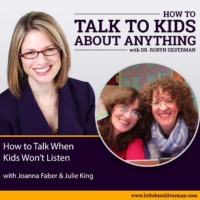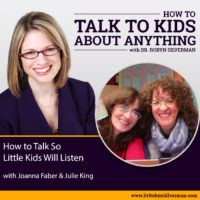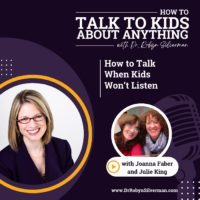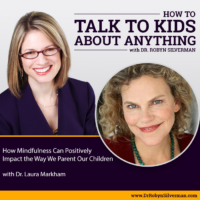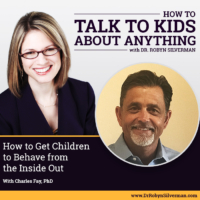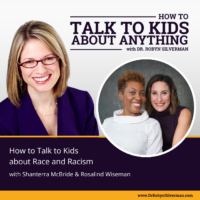Podcast: Play in new window | Download
Subscribe: Apple Podcasts | RSS | More
How to Listen and Effectively Communicate with Children
This podcast episode focuses on how to effectively communicate with children. From knowing the biggest issues people face when trying to effectively communicate to understanding the keys to effective communication, Bento Leal and Dr. Robyn Silverman discuss strategies for success. How do we reach our children? How do we bridge the gap when emotions run hot? How and when do we apologize, praise and become an empathic listener? This week’s podcast addresses both communication problems and solutions.
Special Guest: Bento Leal
We all know that one of the most important parts of talking to kids—or really, talking to anyone you care about, is listening.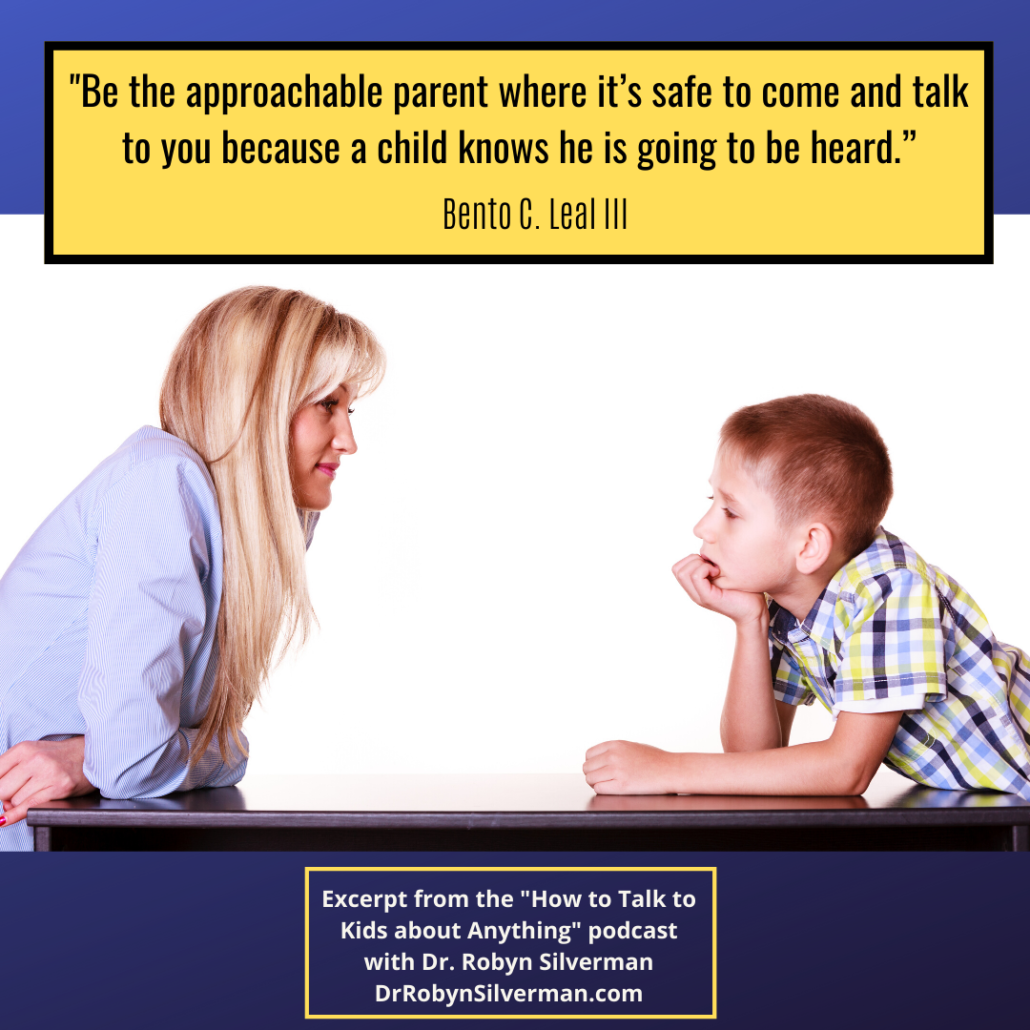 Of course, with so many obligations, online notifications, overfilled schedules and to-dos, listening these days can sometimes be a challenge. Still, it’s listening, that builds trust, allows for mutual understanding, creates connection and helps us to avoid miscommunication. Most people will tell you that is no better conversation than one that makes you feel like someone really listened, saw your point, got you. And this is absolutely true for both adults and children. The right kind of listening can help our kids divulge what’s really on their minds and hearts now…and in the future. What is the secret to listening in a way that gets our kids talking? For that, we turn to Bento Leal.
Of course, with so many obligations, online notifications, overfilled schedules and to-dos, listening these days can sometimes be a challenge. Still, it’s listening, that builds trust, allows for mutual understanding, creates connection and helps us to avoid miscommunication. Most people will tell you that is no better conversation than one that makes you feel like someone really listened, saw your point, got you. And this is absolutely true for both adults and children. The right kind of listening can help our kids divulge what’s really on their minds and hearts now…and in the future. What is the secret to listening in a way that gets our kids talking? For that, we turn to Bento Leal.
Bento Leal is a Relationships Skills Trainer and Bestselling Author who has taught marriage and relationship skills classes and parenting skills classes to more than 2500 couples and singles at family resource centers, community organizations, churches, substance abuse recovery programs, county jails and federal prison throughout California.
In 2017, he published his first book “4 Essential Keys to Effective Communication in Love, Life, Work—Anywhere!” It continues to be an Amazon Best Seller in several categories and has sold more than 50,000 copies to date.
The podcast provides:
- The biggest problems in interpersonal communication between people—and specifically with children.
- How do we solve these interpersonal communication problems
- Why and how empathy is important to effective communication
- The 4 keys of effective communication
- How to really listen even when something is difficult to hear
- How to show yourself as an empathetic listener
- How to use an apology as a “door-opener.”
- The 3 As of applaud, admire and appreciate- and how to use them
Important Messages:
- Biggest problems with effective communication with kids: Often want to fix, advise and teach rather than listen to
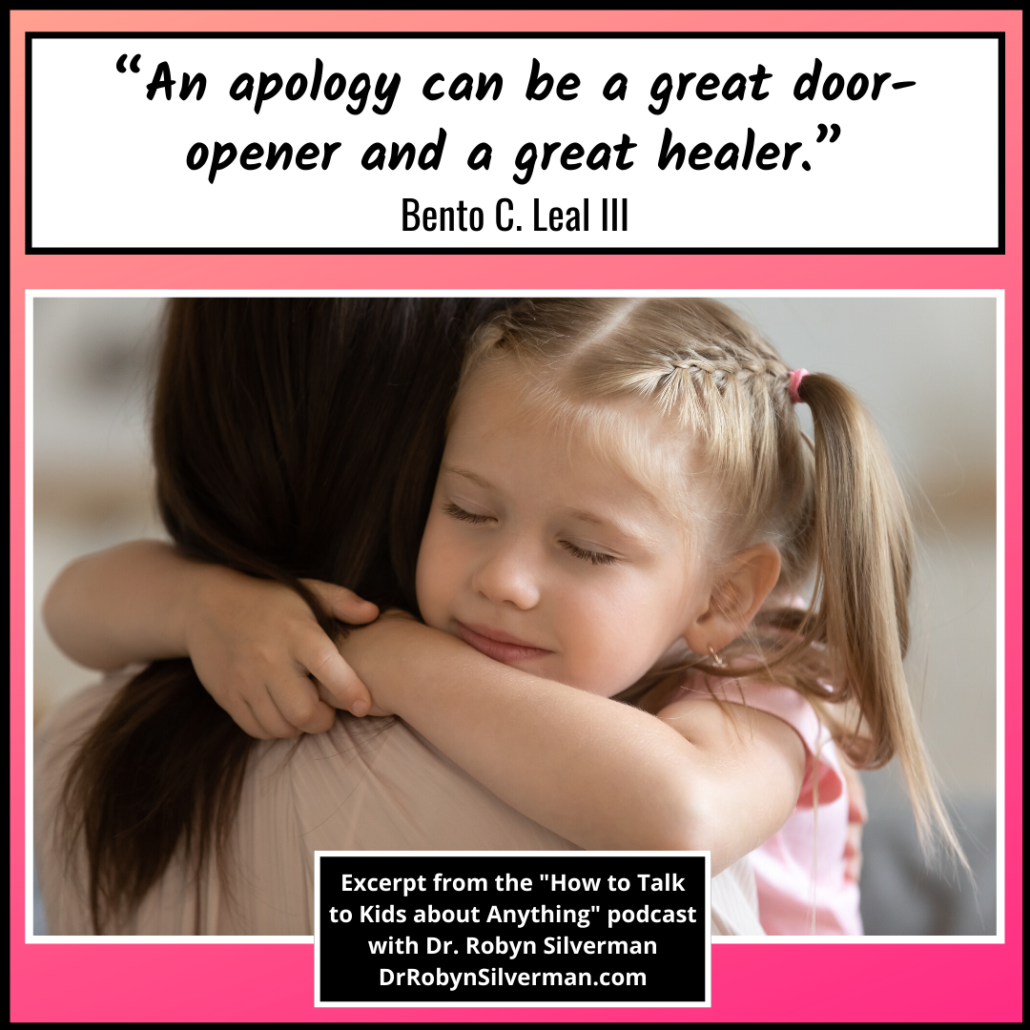 understand. Stephen Covey has advised to listen to understand not to be understood. Many parents get it wrong- when thinking about the fix rather than really listening- they miss what is really being said.
understand. Stephen Covey has advised to listen to understand not to be understood. Many parents get it wrong- when thinking about the fix rather than really listening- they miss what is really being said. - One way to help your child and ensure that you heard right is to reflect back what the other person said; “so you feel this,” “I hear you saying this,” So you know you got it right and that the child knows that you heard them right.
- Need to quiet our mind- often kids just need a listening ear and then they’ll come to their own conclusions. Need a sounding board.
- Don’t jump in when they aren’t all the way through what’s on their minds- wait until after to divulge your thoughts.
- Some kids feel like if they say 5 words they’ll get a paragraph coming back, a lecture. Allow kids to exhale what’s on their mind!
- Empathy: So important to communication.
- Don’t make the other person who has a problem or issue INTO a PROBLEM.
- 4 Keys of effective communication:
- Empathic Awareness of the value and dignity of myself and the other person.
- Each person is unique, special valuable.
- Instead of thinking “This person is a problem” think “I have a problem with this person’s behavior I need to talk with them about.”
- Empathic Listening to understand their thoughts and feelings on the subject.
- Listening to understand, not listening to fix or rebut.
- Saying back the essence of what was said to make sure you understood correctly, and the speaker feels understood.
- Empathic Speaking expressing myself thoughtfully and not blamefully.
- XYZ Message – “When you…., I feel…” rather than accusatory “You always…”
- Empathic Dialogue – the pattern of taking turns speaking and listening to successfully discuss any topic.
- Empathic Awareness of the value and dignity of myself and the other person.
- Listen through the words. Go through the top of their iceberg to understand their feelings. Speak in a way that doesn’t “impale” the other person.
- Don’t use a “harsh start.”- Gotman. Then the other person throws up a roadblock. Show respect for the other person that allows for the person speak.
- Then each person can go back and forth empathically.
- Greater than 50% of communication is nonverbal.
- Be the approachable parent where it’s safe to come and talk to you because a child knows he is going to be heard. Know you are not going to lecture or shut down.
- Problems and solutions:
- Not listening correctly – Listening Blocks to Effective Communication
- Interrupting, thinking of response instead of listening all the way through to what the person is saying and feeling, getting distracted.
- Solution: Empathic Listening to understand – focusing on what the person is saying and feeling from their point of view.
- Blurting out in anger – instead of expressing concerns thoughtfully, non-blamefully
- Solution: Pause, Respect, deliver an XYZ Message (I-Message) “If you play video games for 4 hours per day (x), then I’m afraid that you aren’t going to have enough time to get out into nature and get some fresh air (y) and my feeling is that I’m very frustrated and worried about that (z).
- Not listening correctly – Listening Blocks to Effective Communication
- Tips:
- Listen to Understand (as Stephen Covey would often say), instead of listening to speak. If you listen in that way, you’ll be a more approachable parent – a person your child feels safe and comfortable to go to for their problems, concerns, decisions – whatever.
- Value your child for who they are instead of who you wish they were. This is unconditional love in action.
- Don’t blurt out in Anger – Calm down and express your concerns and feelings thoughtfully without being blameful and accusatory. (If you blurt, you could hurt!)
- Don’t use inflammatory words- nobody wants to get stung! (Hey, you idiot!) Kids will shut down. Need to express ourselves with an “I” statement not a “you” statement.
- Quiet your mind. What stops the knee-jerk reaction? But when has blurting out in anger helped me in the past? Probably remember quickly—never. It the pause button for a second. If you blurt, then have to put the fire out. Use the pause button first—and speak more calmly. BUT what if you feel so strongly—1000 degrees about something and don’t want to water it down? If I calm down, then not being authentic. BUT if come with a flame thrower, don’t be afraid if they put up a wall because nobody wants to get burned.
- If you want to be heard, speak thoughtfully.
- If you use a flame thrower, they’re going to put up something flame retardant.
- Empathy is like a muscle. Work on it a step at a time.
- Apology. Some people feel that you are losing your position as an authority figure if apologize.
- Don’t erase your apology with a but that says, the reason I blew up like that was YOU!
- Listen instead of defending yourself.
- None of us are perfect- even if we are an expert in the field- you are still a human being.
- The apology shows that you are human but also acknowledges that they are too. ~ Dr. Robyn
- Instead of “great job.” Applaud, admire, appreciate: Waters the relationship garden with your child. Make sure to say “why.” “I want to applaud you for the school assignment you did. You worked so hard.” The why brings it home- helps them to know you noticed.
- Water your relationship garden with each kid. And the relationship garden is different for each kid! The water for one is not the same as the water for another. Each child is their own garden. They are not all the same. Each one blooms in the same way. Keeps precious lens on the children- helps you to see what’s right, not just what’s wrong.
- Character connecting (connecting the praise to the person’s character)- Dr. Robyn’s Powerful Words program. Connect the praise to who that person is. See their strength.
- Listen to understand. Listen to make sure you get it right. Listen all the way through.
- Value your child for who they are instead of who you wish they were.
Notable Quotables:
- “One of the biggest problems in parent-child communication is that if a child is talking about a problem or issue
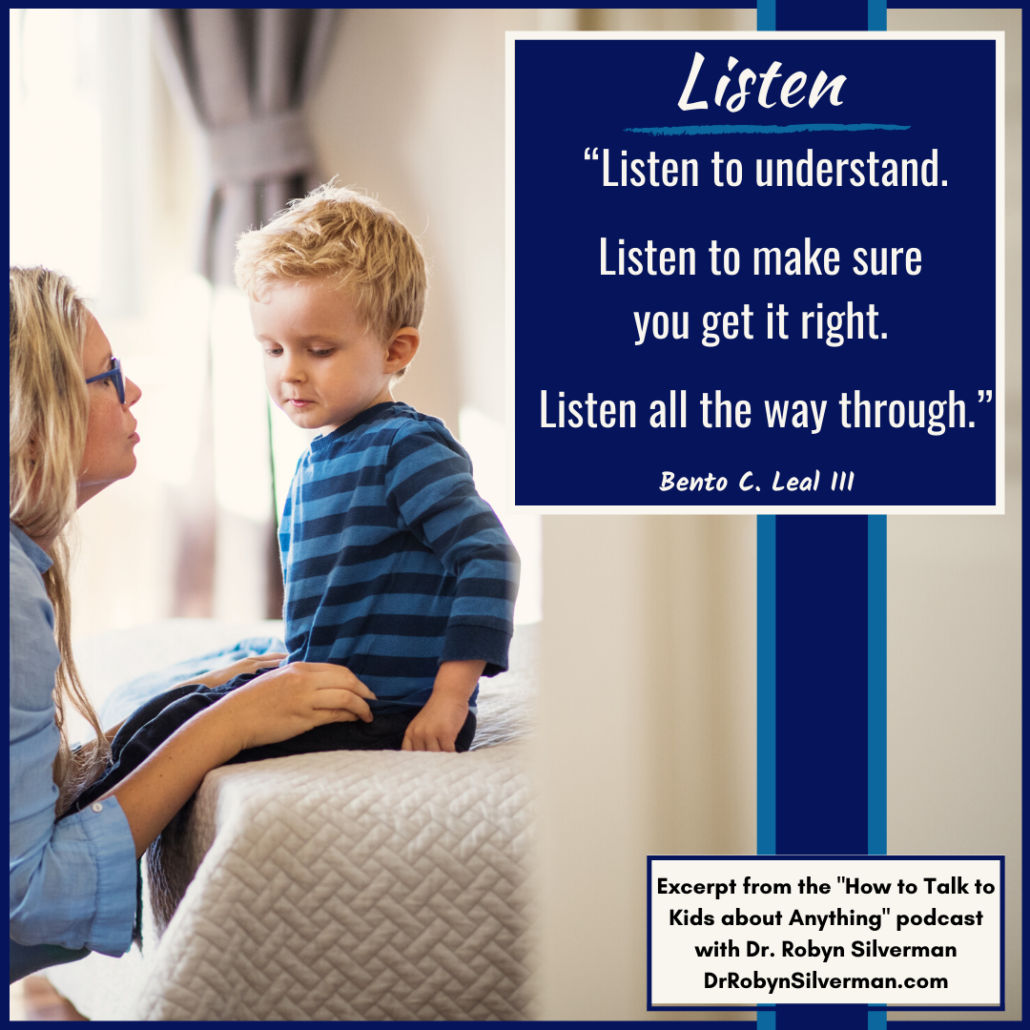 they have, being a well-intended parent, we want to, as quickly as we can, help them to overcome it, remove the pain and anxiety. So often we are listening to fix, advise or teach rather than simply listening to understand.”
they have, being a well-intended parent, we want to, as quickly as we can, help them to overcome it, remove the pain and anxiety. So often we are listening to fix, advise or teach rather than simply listening to understand.” - “Often the child just wants to be heard. If they can just unpack their mind and heart, a lot of times they’ll come to their own conclusions of what they need to do.”
- “Speak in a way that expresses yourself honestly and authentically but doesn’t impale the other person.”
- “Greater than 50% of communication is nonverbal…you may listen more through your eyes than through your ears!”
- “Be the approachable parent where it’s safe to come and talk to you because a child knows he is going to be heard.”
- “When we blurt out in anger or use inflammatory words, our kids shut down and put up a wall because nobody wants to get stung.”
- “You might think; ‘I feel 1000 degrees about this topic as a parent- I don’t want to water it down to 200 degrees because I won’t be expressing myself as I feel.” Okay; but if you come with a flame thrower, don’t be surprised if your children put up a wall because nobody wants to get burned.”
- “Empathy means I’m putting myself in my child’s shoes not only when it’s a hot issue, but anytime when it’s a meaningful topic.”
- “Don’t erase an apology with a ‘but.’”
- “I was in the wrong. I shouldn’t have talked to you like that…and if you are open to it, I’d like to have that conversation again. I want to understand what’s going on your side and listen to how you feel.”
- “An apology can be a great door-opener and a great healer.”
- The apology shows that you are human but also acknowledges that they are too. ~ Dr. Robyn
- “Keep that precious lens on the parent. ‘I’m not always looking for what you might do wrong but I’m always on the lookout for what you are doing right. And I want to see that and validate that.’”
- “Listen to understand. Listen to make sure you get it right. Listen all the way through.”


